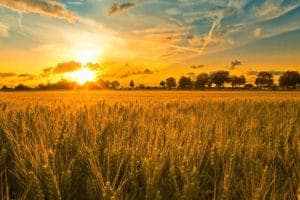You can’t go too far wrong with a good Thanksgiving.
For starters, everything smells good all day, even me. Then, everybody’s nice as pie for as long as they can stand it.
It’s our only holiday when we’re supposed to think about what we eat, the folks who produced it and the land it comes from. Thoughts of Pilgrims and Indians may flash by between a wing and the prayer. Then everyone falls asleep watching the Detroit Lions lose another football game.
I’ve shirked my fatherly duties to 23-year-old Molly. She never got either my three-hour, before-the-meal lecture on The True Meaning of Thanksgiving or my four-hour, after-the-meal talk on Indigestion, Its Causes and Cures. Molly has always been happy with her modest vegetarian meal, which excludes all meat and vegetables and incorporates, she says, the good kind of calories that are concentrated in buttered rolls, pies and whipped cream.
I’ve never told her that I was once related by marriage to Oceanus Hopkins, the one child born on the Mayflower during its two-month crossing in 1620. Oceanus made no other history in his three years, though in times like these all of us admire the value his parents placed on liquidity.
In his honor at Molly’s birth I proposed naming her, Farmponda Seltzer.
Melissa was pushing Hannah or maybe Ashleigh. As of last week, 6,347 of Molly’s 6,505 online friends were named Aszchleigh, Ashlee, A’shli and close derivatives like Joe and Bob. All the rest are named Whitney, Wittknee or W’itneigh.
Melissa and I were deadlocked. She told me straight to my face that Farmponda was “dumb,” and so was Oceanus. She also objected to Swimmin’holea, but didn’t state why.
In a little known historical footnote, I was also related through this same earlier marriage to Ethelred the Unready, King of England about 1,000 years ago. Ethelred was known for losing battles to the Danes who kept invading England so that Ethelred would give them a big bribe — the Danegeld — to not invade anymore, which they continued to do to get more bribes.
The Danes won by pelting the English with lead-filled cheeseballs, against which the English legs of mutton were ineffective. Ethelred was the first coach to learn that good pitching always beats good hitting.
In any case, Melissa said that no Seltzer of hers was going to be named anything like Unready or FredandEthel. And if I continued to submit such candidates, I would henceforth be considered Upacreekus Seltzer.
For her first six months, Molly was officially referred to by the Middle-Eastern sounding, “Un-Name-Med Baby Seltzer” until birth-registry officials put their collective feet down and stomped us into Mary Rebecca. From which we salvaged, Molly.
Oceanus did make the First Thanksgiving in 1621. The second was held in 1863 after President Lincoln issued his famous “Eat-A-Turkey Proclamation,” which freed all the geese in Yankeeland but did nothing for those in the Confederacy.
The 1621 get-together wasn’t called Thanksgiving incidentally. The Pilgrims reserved that name for religious celebrations. It was, instead, a three-day, boogie party, which Puritans were not exactly known for.
As a traditional English Harvest Festival, it was held in late September or early October. Had the Pilgrims deferred eating until late November, the only thing left to harvest on Cape Cod would have been Red Sox hopes for the next season.
Forty or so Pilgrims gathered with twice that number of Pokanokets, a tribe in the Wampanoag Nation, led by Massasoit. Some of the Indians wore some things, and others did not, but, after a year, the Pilgrims were down with the lack of apparel on significant others. “We cool,” the Pilgrims said, as they dapped each other until they got confused.
The Pokanokets brought five fresh deer. The Saints, as the Puritan Separatists called themselves, pitched in some ducks, pottages (stews) and barley-based beer. They also contributed a turkey or two that they had lugged across the Atlantic. Their descendants justly claim to have come over on the Mayflower.
It seems that Columbus and other Spanish do-gooders had carried home domesticated turkeys from Central America. By the mid-1550s, the New World turkey was being gobbled in England.
Had Massasoit not helped the invaders — and had they not made some good decisions about dealing with the Natives — the Pilgrims would have probably perished in their first year. They knew less about living in the country than your average Cub Scout who cannot win his first merit badge.
Massasoit needed the English in his balance-of-power dealings with other tribes. His people had been ravaged by plague, so they looked to the colonists as military allies. For their part, the Pilgrims needed local folks to show them the ropes before they reached the end of theirs.
In these first days, the Pilgrims saw the Natives as equals in many ways. Times changed, as did opinions. Today, the Pokanoket tribe seeks federal recognition.
First-person accounts in 1621 indicate that everyone had a fine time, even the Saints. They took 75 points and the Lions, which was a first for Christians in a long time. The Pokanokets, who thought betting was for suckers, quickly built a casino with a Fight-All-Sin motif. They named it, The Dooms.
Deer, not turkey, should be the featured main course of our modern Thanksgiving.
Why didn’t that happen? The deer we find today attacking moving headlights are no different than those of 400 years ago—still a little gamey to those who think meat is what’s found in a Big Mac.
But domesticated turkeys have been genetically rejiggered into something called the Broad-Breasted White–a bird that can’t fly, can’t run, can’t stand up half the time and can’t even get it on. They are injected with a basting liquid because we harvest them before they develop flavorful fat on their dry white bosoms. They don’t taste wild, and they’re plump because they barely move.
Frankly, I don’t care that the Broad-Breasted White is the ultimate couch potato. It tastes good, and I’ve never messed one up in 40 years of stuffing, cooking and carving.
Unlike vehicles, turkeys are a success story of American industry. Most of us like their heavy-front-bumper design. They’re competitively priced and fuel efficient. They are one step we can all take toward ending America’s addiction on foreign food.
Have you ever had an American turkey blow itself up like a Ford Pinto? Of course, not. This proves that America can still produce a bird that is safe to eat at any speed.
I reluctantly bought a big Ford pickup truck a few years ago. It had the coltish habit of throwing itself into four-wheel drive on its own initiative and stopping dead on Interstates. Not once have I had an American turkey quit roasting because it was no longer in the mood.
The American Thanksgiving turkey is not a turkey in the sense of deserving a life-time lemon award. We should stop calling Detroit vehicles, turkeys. It’s insulting to turkeys. We should call them AIGs or Edsels the Unready.
Some object to the supermarket tom as industrialized food. These folks don’t like genetic engineering of the type that changed the wolf into the Chihuahua. They favor old-time turkeys, like Narragansetts and Bourbon Reds. They object to chemicals and confinement.
For me, the Broad-Breasted White does exactly what I expect, which is more than I can say for most things in life.
This Thanksgiving a lot of us are in a jam that’s not of our own making. We are thankful that things aren’t worse and hopeful that they won’t be. It feels like we’re the Pilgrims, looking for a hand in a big, hostile world.
Thanksgiving is still a harvest festival, though most of us never get closer to a field than reaping the rows of our local supermarket. It’s worth remembering that every morsel in every aisle starts on a farm.
I’m thankful that there are still enough farmers willing to do an often thankless job.
And to be honest about it, Molly’s very thankful that I didn’t name her, Frogponda.
This content may not be used or reproduced in any manner whatsoever, in part or in whole, without written permission of LANDTHINK. Use of this content without permission is a violation of federal copyright law. The articles, posts, comments, opinions and information provided by LANDTHINK are for informational and research purposes only and DOES NOT substitute or coincide with the advice of an attorney, accountant, real estate broker or any other licensed real estate professional. LANDTHINK strongly advises visitors and readers to seek their own professional guidance and advice related to buying, investing in or selling real estate.








Add Comment